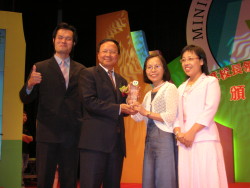Pursuing excellence, setting an example

School curricula and instructions can help students to make progress, to develop multiple intelligences, and so to construct a learning environment "for every student to succeed". As the professional competence of teachers is the key to success, to enforce the 9-year integrated curriculum which is a mission of our time, it is necessary to effectively enhance the professional competence of teachers in order to ensure the quality of curriculum and teaching.
According to Education Minister TU Cheng-sheng, before the implementation of the 9-year integrated curriculum, teachers of elementary schools and junior high schools teach different courses according to the standard contents of respective courses, and the learning method and content are course-centered, thus overlooking the fact that students are the focus of learning.
The 9-year integrated curriculum operated according to the course outlines and competence indicators was thus introduced in the controversy of different parts of the society. According to Minister Tu, the curriculum focuses on the school-based curricular development, especially the professional competence of teachers. Therefore, the enhancement of the professional competence of teachers has become the key to success of the curriculum.
Minister Tu pointed out, the 9-year integrated curriculum is a flexible curricular design emphasizing on the integration capacity of teachers to solve the diametrically opposing boundaries among courses and even knowledge and concepts within a particular course. It also promotes the focus of education from course knowledge learning to the cultivation of overall skills in daily life, so that students can learn in a complete and near real-life curricular framework to improve their learning ability.
To extend the power of curricular reform, the Ministry of Education launched in 2003 the 9-year Integrated Curriculum and Teaching Development Plan-Cultivation of Curriculum and Teaching Development Seed Team to cultivate excellent seed teachers for promoting curricular reform in local counties and cities; and the central curriculum and teaching advisory teacher team was formed in 2005 for the first time to promote exchanges with counselors and schools in local counties and cities in order to spread the idea of the curriculum, pointed out Minister Tu.
In 2006 the MOE launched again the Classroom Teaching Competence Optimization Plan for teachers in order to provide headmasters, principals, chiefs and teachers with ideas and concepts to optimize classroom teaching. Minister Tu hoped that this plan can solve the classroom problems that teachers face and to meet the actual needs of classroom teaching by integrating the central government, local government and school systems in order to improve the professional competence of teaches and the learning achievements of students.
With reference to the current status of implementation of the 9-year integrated curriculum, the MOE will reinforce instruction evaluations and audits in order to urge teachers to improve their professional competence and to supervise the teaching efficiency of schools, Minister Tu maintained, and will emphasize school-focus curricular design, encourage teachers to design, plan, implement and evaluate curricula for their own school, in order to let teachers become the promoter of school curriculum and teaching.
Minister Tu added, MOE will give full support to the organization and operation of curricular and teaching guidance groups in local counties and cities and make full use of the central teaching advisory teacher team and course inspectors in local counties and cities, cultivation seed teachers, and teaching advisory groups in order to help first-line teachers to solve curriculum- and teaching-related problems and ultimately to improve the professional competence of teachers and to ensure teaching quality effectively.